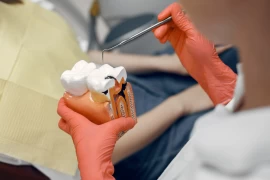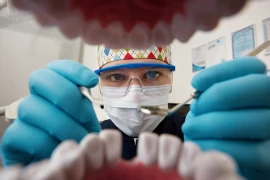
Gum Diseases Are a Risk for Your Kidneys
- Gum Diseases Are a Risk for Your Kidneys
- Gum Diseases and Their Systemic Effects
- The Link Between Periodontitis and Chronic Kidney Disease
- An Infection That Begins in the Mouth Can Exhaust the Kidneys
- Consequences of Untreated Gum Disease
- What Should You Do?
- In Conclusion...
If you think oral health is merely an aesthetic issue, I must tell you that you're mistaken. As a periodontology specialist, let me clearly state this: your gum health is an inseparable part of your overall systemic well-being. Especially when it comes to your kidney health, the connection is far deeper than you might imagine.
Gum Diseases and Their Systemic Effects
The first thing you need to understand is this: gum diseases are chronic inflammatory conditions that affect not only the supporting tissues of the teeth but also various systems throughout your body. This silent inflammation that begins in the gums can spread harmful substances into your bloodstream, eventually threatening distant organs. And this is precisely where your kidneys come into play.
The Link Between Periodontitis and Chronic Kidney Disease
Studies show that chronic periodontitis can negatively impact kidney function. As periodontitis progresses, bacteria residing in the oral cavity—especially pathogens like Porphyromonas gingivalis—can enter the bloodstream and circulate systemically. This process triggers a chronic inflammatory response in your body, leaving your kidneys vulnerable to damage from this continuous inflammatory load.
If you already have diabetes or another systemic disease such as hypertension that affects the kidneys, periodontal disease poses an even greater risk for you. That’s because these conditions can simultaneously affect both your gum tissues and your kidney tissues. Periodontal infections may reduce your glomerular filtration rate and lead to elevated serum creatinine levels.
An Infection That Begins in the Mouth Can Exhaust the Kidneys
You may unknowingly have a silent gum disease that has been slowly affecting your kidneys for years. Because periodontal diseases are often painless, they can go unnoticed. However, your immune system remains under constant pressure. This low-grade chronic inflammation may result in kidney scarring, reduced filtration capacity, and eventually the development of chronic kidney disease over time.

Consequences of Untreated Gum Disease
If you neglect your gum health, you risk more than just losing your teeth—you could be facing damage to vital organs. Scientific data indicates that individuals who receive periodontal treatment experience improvements in kidney function. This demonstrates the critical role of periodontal therapy not only in preserving oral health but also in protecting your systemic well-being.
What Should You Do?
There are several important steps you can take:
Regular Dental Check-ups: See a periodontist at least twice a year to monitor your gum health.
Maintain Proper Oral Hygiene: Brush your teeth twice a day with the correct technique and use dental floss or interdental brushes.
Manage Risk Factors: If you have diabetes, keep your blood sugar under control. If you smoke, quit as soon as possible.
Professional Cleanings: Without professional removal of plaque and tartar, gum disease cannot be effectively managed.
In Conclusion...
You should be aware that a small focus of inflammation in your mouth may be affecting one of your body’s most vital organs—your kidneys. Taking your periodontal health seriously will protect not only your teeth in the long term but also your general health and overall quality of life.
Remember, a healthy mouth opens the door to a healthy body. If you want to protect your kidneys, start by taking care of your gums.

Prof. Dr. Elif Eser ACAREL
Specialist in Periodontology





